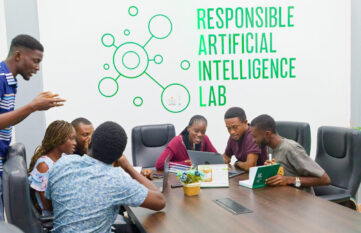Like many countries across the globe, Indonesia has a massive rural-urban digital gap. The reasons for this are complex: rural areas are too remote, there is a lack of necessary infrastructure and the population is facing further challenges such as poverty and resource scarcity. However, a number of initiatives have set themselves the goal of closing this gap, including the School of Community Networks and the annual Rural ICT Camps.
This past October, GIZ’s FAIR Forward Initiative team was invited to the 2023 edition of the Rural ICT Camp in Pulo Aceh, Indonesia. The topic was rural resilience, or Desa Tangguh in Bahasa Indonesia, and the four-day workshop was hosted by Common Room. The community network organization is committed to digital connectivity in rural areas. Their work centers around the “5 L principles”, ensuring community-based internet infrastructure: low tech, low energy, has local support, needs low learning curve, and requires low maintenance.
FAIR Forward shared some of its own work during a webinar focusing on how language AI can help with digital connectivity and allowing a wider range of people to interact with digital services in their language. Their partners, Prosa.ai, an Indonesian startup working in natural language processing (NLP), discussed the importance of preserving local languages and dialects, emphasised the role of local languages and dialects. Not only do they contribute to the preservation of cultural and identity-forming elements, they are also the basis for local digital solutions such as information chatbots. Ibu Ayu from Prosa.ai and her team are gathering data for local languages, including Bahasa Bali, Bahasa Bugis, and Bahasa Minang. They stressed the importance of recruiting diverse annotators, who create and label the datasets, and engaging local communities to ensure a comprehensive representation of dialects.
“Local languages are a heritage and identity of our nation. When they vanish, a part of our national heritage is lost.”
Ayu Purwarianti, co-founder of Prosa.ai
Local and visiting leaders at Rural ICT Camp also shared common concerns of the limited and often expensive nature of internet infrastructure in rural. This is also a major hindrance for the spread of digitalization, even in relatively well-served areas of Indonesia, such as in East Java. While the inaccessibility of rural areas and their low population disincentivizes private providers from investing in them, communities have come up with alternatives. These include using village venture funds to support infrastructure construction, as well as using locally available materials such as bamboo to build poles. But even these alternatives are subject to local political agendas, land ownership, and the prevalence of natural disasters that destroy the infrastructure.
Lack of digital literacy also has an impact on outcomes of digitalization, with many unable to fully access the benefits of being online. This gap is worsened for people at the intersection of different identities, particularly women and people living with disabilities, adding another layer of disadvantage to catch up to on.
For instance, during the language annotation session, the participants were given a broken telephone to practically illustrate the challenges around low-resource language data collection, annotation, and translation. This was to account for both the lack of internet connection, as well as the digital education gap in the audience; no one in the session, other than the Common Room facilitators, had heard of ChatGPT.
The communities, however, are not waiting around to start. Previous lessons learnt during extreme weather events as well as the pandemic, now form the building blocks for some of their new ventures towards digitalisation. Among them are the expansion of E-Klopon, a TV-based remote learning program created by ICT Watch, which ensured children kept up with their classes during lockdown despite having no internet access.
Similarly, the Risk Communication and Communication Engagement (RCCE) Working Group, which was initially created to facilitate Covid risk communication, has now expanded to cover more disaster communication. It also acts as an intermediary between local communities and the other levels of government, strengthening community engagement in disaster risk management.
Indonesian rural communities are taking their development into their own hands but require continued support to see their projects through. GIZ, with its longstanding experience in climate and AI projects, can offer concrete knowledge and support to these actors, and ensure rural communities are well on their way to a sustainable digital transformation.







